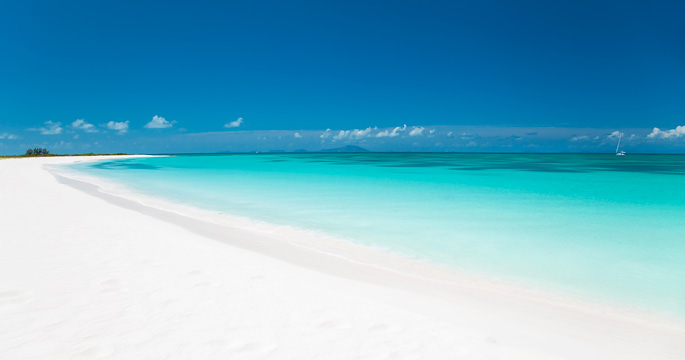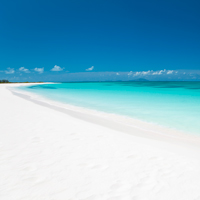One of the great things about going to the Caribbean is discovering those quiet places where you can disconnect and turn off the outside world. Not an easy thing to do in busy cruise ship ports or when staying at a mega resort. But fortunately, there are islands that hold on to their past, have a respect for nature and the environment and provide all the ingredients for an ideal escape. Here are five of my personal favorites.
Saba
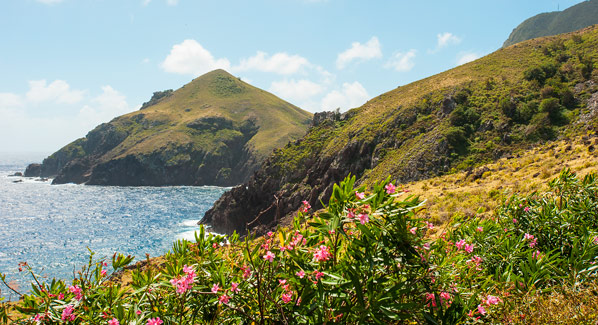
Saba’s coastline rises precipitously from the sea. Instead of sandy beaches and waving palms, this island offers picturesque villages and hiking trails that lead to cloud forests. Photo: Debbie Snow
Saba is a Caribbean island unlike any other. There are no palm- lined beaches, no casinos or nightclubs, no cruise ships, and never, ever a crowd of tourists. Rising steeply from the sea, Saba’s green-clad slopes are dotted with a collection of storybook villages, where white-walled cottages sport green shutters and red roofs, and stonewalls are layered in flowering vines. A single highway carves a serpentine path along the slopes to connect these settlements; hiking trails fan outward and upward to elfin- like cloud forests that thrive in the highlands of the long-extinct volcanic summit. Surrounding waters, which lie within a marine reserve, provide divers with unique underwater geological formations and fish-laden reefs. The island is so small that everyone knows everyone. It’s friendly and whimsical at the same time. Though connected to the world by both island ferry and small planes, Saba maintains a sense of otherworldly isolation that’s increasingly hard to find in the modern world.
Anegada
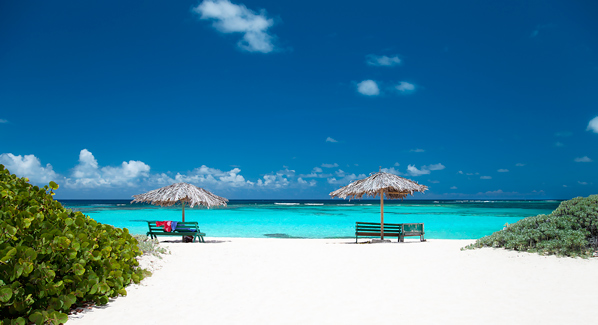
Anegada’s beaches are never crowded. Some hardly see a human footprint, as most visitors congregate at one of several lively beach bars along the central coast. Photo: Christian Wheatley/iStock
Twenty miles of blue water separate the low-lying shores of Anegada from higher-profile islands of the British Virgins. And it’s not just geography that sets this less-visited outpost apart. Miles of near-deserted white-sand beaches overlook a barrier reef that has claimed hundreds of shipwrecks. A smattering of small guesthouses and fishermen’s camps line the western coast, and much of the interior remains an unsettled realm of tropical scrub and salt marsh. A handful of day-trippers make the crossing from the island of Virgin Gorda each day, settling in at one of the beach bars on the windward coast, and some linger for the island’s signature dinner of barbecue lobster. Come evening, things get really quiet, and the stars come out in a sky where no streetlights mar the view.
Montserrat
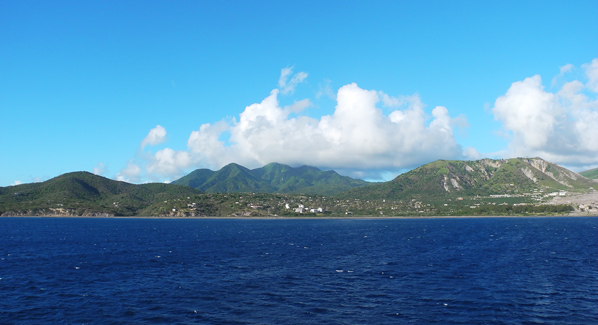
Clouds hover over the peak of Montserrat’s Soufriere Hills. Two decades after this volcano’s last major eruption, visitors are once again discovering this green gem of an island. Photo: Debbie Snow
Once known as the “Emerald of the Caribbean” Montserrat was a green and fertile island that attracted discriminating visitors who appreciated the bucolic lifestyle. In 1995, a volcano came to life, spewing lava, smoke and ash that forced more than half the island’s population to evacuate. Today the Soufriere Hills Volcano still spurts some steam and ash, but scientists predict the eruption cycle is waning and will soon die out. Today, the island’s southern coast is coated with hardened lava that reaches from the cone to the coast. Meanwhile, the northern part of the island has returned to green and eco-tourism has taken off. Hiking is a favorite activity. The northern hills are laced with a network of forest footpaths, while a trip to the south takes you into an otherworldly landscape that presents a fascinating glimpse at the aftermath of the eruption.
Bequia
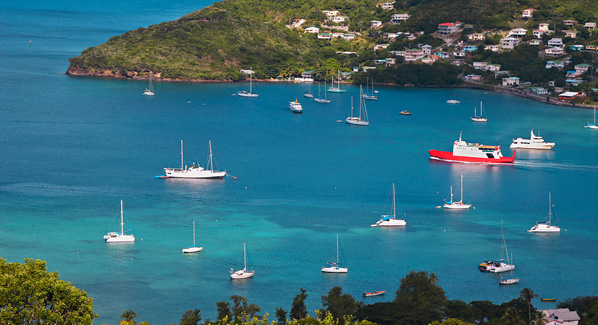
An island ferry departs the anchorage at Bequia’s Admiralty Bay. In centuries past, this harbor sheltered pirates, merchantmen and whalers. Today, it’s a favorite with cruising yachtsmen. Photo: iStock
Maritime traditions run deep in Bequia, and continue to this day. Native shipwrights still handcraft island-style boats using tools and traditions passed down through generations. Reminders of the island’s pirate past and whaling days linger, but the anchorage at Admiralty Bay is now filled by cruising yachtsmen, who include this favorite port of call on sails through the Grenadines. Bequia does receive visits by day-trippers from small cruise lines, but their temporary presence doesn’t overwhelm, and merely adds an extra dimension to the waterfront activity. The main street is for pedestrians only and an eclectic mix of bars and restaurants that hug the waterfront. Settle in and you’ll likely hear tales of voyages far and near, and maybe a few tales of the old days.
Iles des Saintes
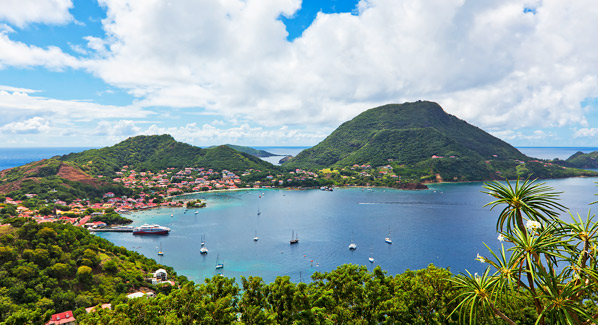
The largest of the trio of islands of Les Saintes, Terre-de-Haute delights with a scenic waterfront district where small cafe’s and restaurants deliver a taste of France. Photo: Oliver Hoffmann/iStock
On this trio of small islets off the southern coast of Guadeloupe, the best of France has been transported to the Caribbean. On Terre-de-Haut, the largest of the three, the town of Le Bourg provides a quintessential seaside setting, to which is added a Gallic touch. Think café au lait, crisp banquettes hot from the oven, and just-caught seafood simmering in white wine and savory herbs. Most visitors are French, which adds a refreshing European flavor to the scene. Many come from the main island of Guadeloupe for the day and are gone by sunset. Stay at one of the island’s small hotels and you can practically have the place to yourself after five o’clock.

